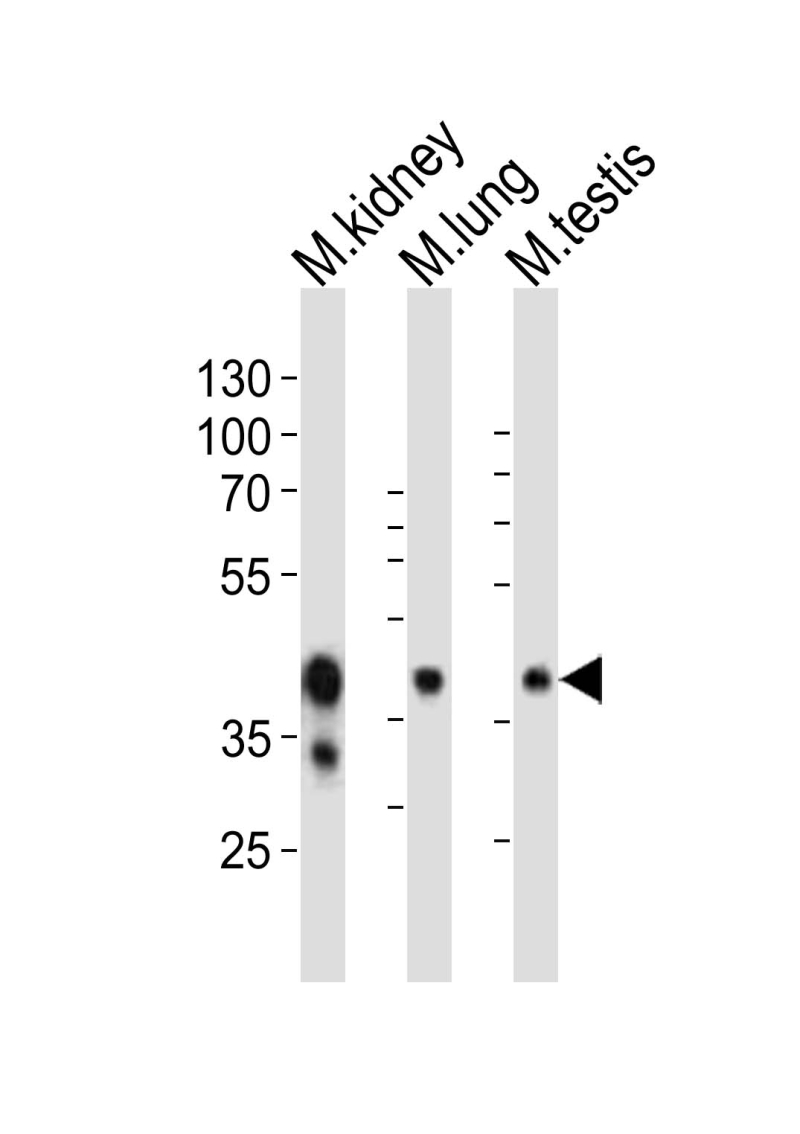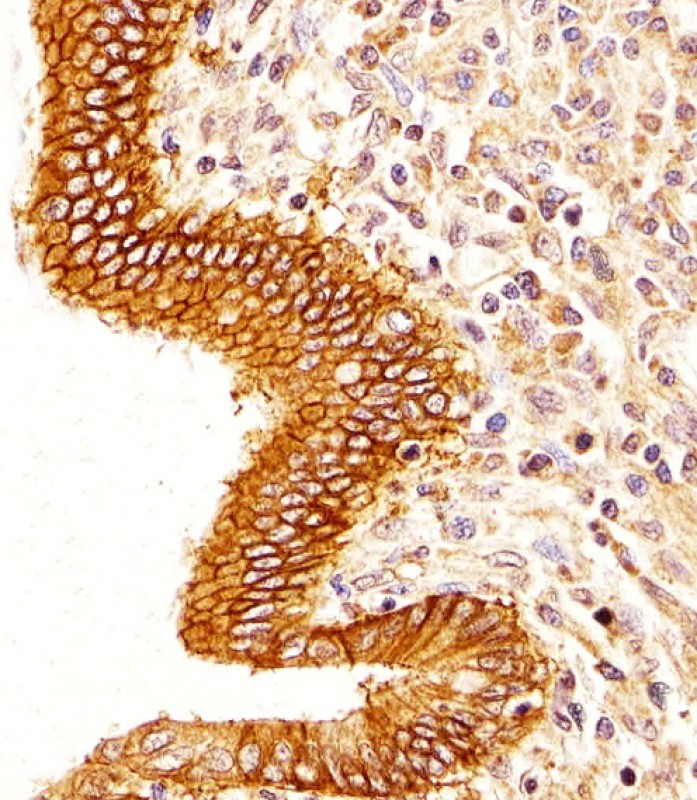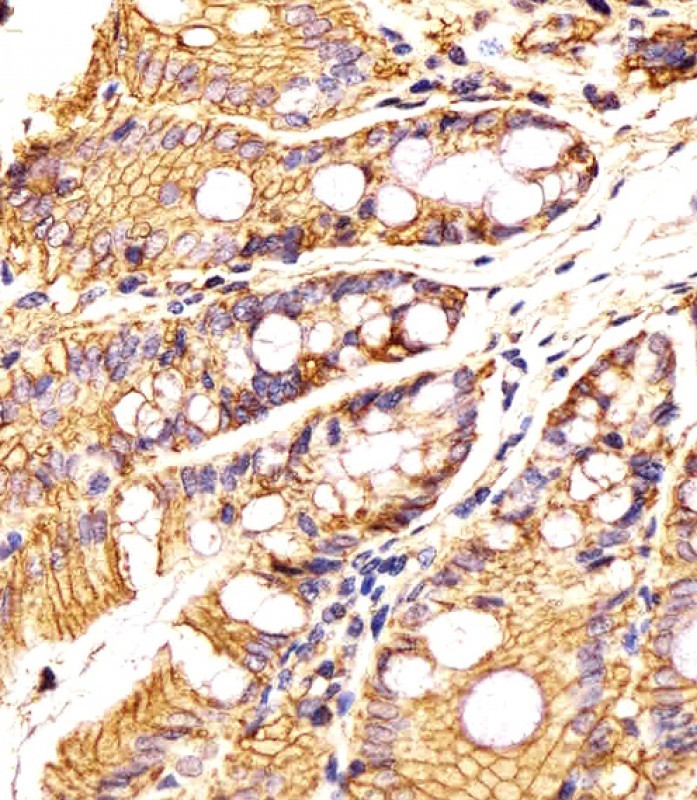



| WB | 1/1000 | Human,Mouse,Rat |
| IF | 咨询技术 | Human,Mouse,Rat |
| IHC | 1/100-1/500 | Human,Mouse,Rat |
| ICC | 技术咨询 | Human,Mouse,Rat |
| FCM | 1/25 | Human,Mouse,Rat |
| Elisa | 咨询技术 | Human,Mouse,Rat |
| Aliases | Epithelial cell adhesion molecule, Ep-CAM, Epithelial glycoprotein 314, EGP314, mEGP314, Protein 289A, Tumor-associated calcium signal transducer 1, CD326, Epcam, Tacstd1 |
| Entrez GeneID | 17075 |
| WB Predicted band size | 35.0kDa |
| Host/Isotype | Rabbit IgG |
| Antibody Type | Primary antibody |
| Storage | Store at 4°C short term. Aliquot and store at -20°C long term. Avoid freeze/thaw cycles. |
| Species Reactivity | Human, Mouse, Rat |
| Immunogen | This mouse Epcam antibody is generated from a rabbit immunized with a KLH conjugated synthetic peptide between 302-335 amino acids from the C-terminal region of mouse Epcam. |
+ +
以下是3篇关于小鼠Epcam抗体的代表性文献,按领域分类简要总结:
---
1. **文献名称**:*Isolation of circulating tumor cells in mice via CD45-depletion and immunomagnetic EPCAM enrichment*
**作者**:Schenk J.P., et al.
**摘要**:开发了一种基于Epcam抗体免疫磁珠的小鼠循环肿瘤细胞(CTC)分离方法,通过CD45阴性分选联合Epcam阳性富集,提高结直肠癌小鼠模型中CTC检测灵敏度。
2. **文献名称**:*EPCAM is required for mouse intestinal stem cell maintenance in vivo*
**作者**:Klein G., et al.
**摘要**:利用Epcam抗体标记和流式分选技术,证明Epcam对小鼠肠道干细胞的自我更新至关重要,抗体阻断实验显示其缺失导致隐窝结构破坏。
3. **文献名称**:*Generation and characterization of a monoclonal antibody against mouse EPCAM for cancer immunotherapy*
**作者**:Sawada T., et al.
**摘要**:报道一种新型小鼠Epcam单克隆抗体的开发,验证其在小鼠乳腺癌模型中的靶向结合能力及潜在治疗应用,包括抗体依赖性细胞毒性(ADCC)效应。
---
**注**:以上文献为领域内典型研究方向示例(CTC检测、干细胞功能、抗体开发),实际引用时建议通过PubMed/Web of Science核对具体标题与作者信息。
EpCAM (epithelial cell adhesion molecule), also known as CD326. is a transmembrane glycoprotein encoded by the *TACSTD1* gene. It plays a dual role in cell adhesion and intracellular signaling, primarily expressed in epithelial tissues during embryonic development and in adult epithelial-derived organs. EpCAM is characterized by its extracellular epidermal growth factor (EGF)- and thyroglobulin-like domains, a single transmembrane region, and a short intracellular domain. It mediates homophilic cell-cell adhesion and regulates processes like proliferation, differentiation, and stemness via cleavage-dependent signaling pathways.
Mouse EpCAM antibodies are critical tools for studying EpCAM biology in murine models, which are widely used in cancer and epithelial research. These antibodies recognize conserved epitopes in mouse EpCAM, enabling applications such as flow cytometry, immunohistochemistry, and Western blotting. EpCAM is overexpressed in many epithelial-derived cancers (e.g., colorectal, breast), making it a biomarker for tumor-initiating cells (cancer stem cells) and a therapeutic target. In mice, EpCAM antibodies like clone G8.8 or Epab1-3 are used to isolate epithelial cells, track tumor metastasis, or assess tissue regeneration.
Research using mouse EpCAM antibodies has revealed its role in maintaining epithelial integrity, modulating Wnt/β-catenin signaling, and promoting tumor aggressiveness. However, EpCAM’s expression varies across tissues and cancer subtypes, requiring context-specific validation. Recent studies also explore its utility in antibody-drug conjugates or bispecific antibodies for cancer immunotherapy.
×